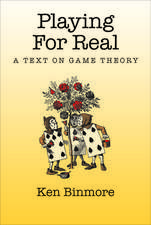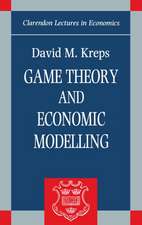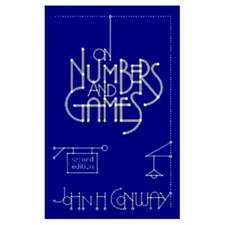Introduction to Game Theory: Universitext
Autor Peter Morrisen Limba Engleză Paperback – 28 iul 1994
Din seria Universitext
- 13%
 Preț: 353.49 lei
Preț: 353.49 lei -
 Preț: 487.96 lei
Preț: 487.96 lei - 15%
 Preț: 543.75 lei
Preț: 543.75 lei -
 Preț: 418.67 lei
Preț: 418.67 lei - 20%
 Preț: 628.22 lei
Preț: 628.22 lei -
 Preț: 322.62 lei
Preț: 322.62 lei - 17%
 Preț: 364.82 lei
Preț: 364.82 lei -
 Preț: 634.38 lei
Preț: 634.38 lei - 17%
 Preț: 427.32 lei
Preț: 427.32 lei - 13%
 Preț: 355.52 lei
Preț: 355.52 lei - 17%
 Preț: 431.50 lei
Preț: 431.50 lei - 19%
 Preț: 429.21 lei
Preț: 429.21 lei - 19%
 Preț: 393.81 lei
Preț: 393.81 lei -
 Preț: 360.08 lei
Preț: 360.08 lei -
 Preț: 358.44 lei
Preț: 358.44 lei - 13%
 Preț: 389.95 lei
Preț: 389.95 lei -
 Preț: 465.61 lei
Preț: 465.61 lei -
 Preț: 371.99 lei
Preț: 371.99 lei - 15%
 Preț: 497.22 lei
Preț: 497.22 lei - 15%
 Preț: 737.46 lei
Preț: 737.46 lei - 17%
 Preț: 394.41 lei
Preț: 394.41 lei - 15%
 Preț: 509.58 lei
Preț: 509.58 lei - 17%
 Preț: 427.68 lei
Preț: 427.68 lei - 8%
 Preț: 495.44 lei
Preț: 495.44 lei - 17%
 Preț: 364.57 lei
Preț: 364.57 lei - 17%
 Preț: 368.15 lei
Preț: 368.15 lei -
 Preț: 396.55 lei
Preț: 396.55 lei - 15%
 Preț: 553.33 lei
Preț: 553.33 lei - 17%
 Preț: 365.35 lei
Preț: 365.35 lei -
 Preț: 356.78 lei
Preț: 356.78 lei -
 Preț: 673.45 lei
Preț: 673.45 lei - 17%
 Preț: 426.76 lei
Preț: 426.76 lei - 20%
 Preț: 569.56 lei
Preț: 569.56 lei -
 Preț: 372.87 lei
Preț: 372.87 lei -
 Preț: 319.07 lei
Preț: 319.07 lei -
 Preț: 379.86 lei
Preț: 379.86 lei -
 Preț: 445.88 lei
Preț: 445.88 lei -
 Preț: 382.36 lei
Preț: 382.36 lei - 15%
 Preț: 533.72 lei
Preț: 533.72 lei - 15%
 Preț: 496.02 lei
Preț: 496.02 lei - 15%
 Preț: 474.82 lei
Preț: 474.82 lei -
 Preț: 389.70 lei
Preț: 389.70 lei -
 Preț: 484.08 lei
Preț: 484.08 lei - 15%
 Preț: 643.48 lei
Preț: 643.48 lei -
 Preț: 415.02 lei
Preț: 415.02 lei - 15%
 Preț: 602.25 lei
Preț: 602.25 lei - 20%
 Preț: 510.24 lei
Preț: 510.24 lei - 15%
 Preț: 588.37 lei
Preț: 588.37 lei -
 Preț: 381.59 lei
Preț: 381.59 lei
Preț: 468.44 lei
Preț vechi: 551.10 lei
-15% Nou
Puncte Express: 703
Preț estimativ în valută:
89.64€ • 95.85$ • 74.74£
89.64€ • 95.85$ • 74.74£
Carte tipărită la comandă
Livrare economică 18 aprilie-02 mai
Preluare comenzi: 021 569.72.76
Specificații
ISBN-13: 9780387942841
ISBN-10: 038794284X
Pagini: 252
Ilustrații: XXVI, 252 p.
Dimensiuni: 155 x 235 x 14 mm
Greutate: 0.35 kg
Ediția:1994
Editura: Springer
Colecția Springer
Seria Universitext
Locul publicării:New York, NY, United States
ISBN-10: 038794284X
Pagini: 252
Ilustrații: XXVI, 252 p.
Dimensiuni: 155 x 235 x 14 mm
Greutate: 0.35 kg
Ediția:1994
Editura: Springer
Colecția Springer
Seria Universitext
Locul publicării:New York, NY, United States
Public țintă
Lower undergraduateCuprins
1. Games in Extensive Form.- 1.1. Trees.- 1.2. Game Trees.- 1.3. Choice Functions and Strategies.- 1.4. Games with Chance Moves.- 1.5. Equilibrium N-tuples of Strategies.- 1.6. Normal Forms.- 2. Two-Person Zero-Sum Games.- 2.1. Saddle Points.- 2.2. Mixed Strategies.- 2.3. Small Games.- 2.4. Symmetric Games.- 3. Linear Programming.- 3.1. Primal and Dual Problems.- 3.2. Basic Forms and Pivots.- 3.3. The Simplex Algorithm.- 3.4. Avoiding Cycles and Achieving Feasibility.- 3.5. Duality.- 4. Solving Matrix Games.- 4.1. The Minimax Theorem.- 4.2. Some Examples.- 5. Non-Zero-Sum Games.- 5.1. Noncooperative Games.- 5.2. Solution Concepts for Noncooperative Games.- 5.3. Cooperative Games.- 6. N-Person Cooperative Games.- 6.1. Coalitions.- 6.2. Imputations.- 6.3. Strategic Equivalence.- 6.4. Two Solution Concepts.- 7. Game-Playing Programs.- 7.1. Three Algorithms.- 7.2. Evaluation Functions.- Appendix. Solutions.

















